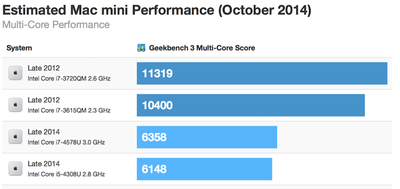Late 2014 Mac Mini Benchmarks Indicate Decreased Multi-Core Performance
The newly refreshed Mac mini is seeing improved single-core performance over the previous models, but decreased multi-core performance, according to a newly released GeekBench benchmark. John Poole of Primate Labs says that the upper tier Late 2012 Mac minis, which had quad-core Ivy Bridge processors, saw better multi-core performance than the new Late 2014 models, which have dual-core Haswell processors.

Unlike single-core performance multi-core performance has decreased significantly. The "Good" model (which has a dual-core processor in both lineups) is down 7%. The other models (which have a dual-core processor in the "Late 2014" lineup but a quad-core processor in the "Late 2012" lineup) is down from 70% to 80%.
Poole notes that Apple may have switched to dual-core processors in some Late 2014 Mac minis because Haswell dual-core processors use one socket to connect the logic board and processor while Haswell quad-core processors use different sockets. This would mean Apple would have to design and build two separate logic boards specifically for the Mac mini, while other Macs use the same logic boards across its individual line.
This trade-off didn't exist with Sandy Bridge and Ivy Bridge processors because both of its dual-core and quad-core processors used the same socket. Another option, according to Poole, is that Apple could have went quad-core across its new Mac mini line, but it would have made it difficult for Apple to hit the $499 price point.
Despite the decreased quad-core performance, the single-core performance of the new Mac mini is in line with other Macs' performance jumps from Ivy Bridge to Haswell.
Base configurations for the Mac mini are currently available for purchase on Apple's online store with pricing starting at $499 and will ship in one to three days. Custom configurations ship within three to five days.
Popular Stories
The long wait for an Apple Watch Ultra 3 appears to be nearly over, and it is rumored to feature both satellite connectivity and 5G support.
Apple Watch Ultra's existing Night Mode
In his latest Power On newsletter, Bloomberg's Mark Gurman said that the Apple Watch Ultra 3 is on track to launch this year with "significant" new features, including satellite connectivity, which would let you...
The iPhone 17 Pro Max will feature the biggest ever battery in an iPhone, according to the Weibo leaker known as "Instant Digital."
In a new post, the leaker listed the battery capacities of the iPhone 11 Pro Max through to the iPhone 16 Pro Max, and added that the iPhone 17 Pro Max will feature a battery capacity of 5,000mAh:
iPhone 11 Pro Max: 3,969mAh
iPhone 12 Pro Max: 3,687mAh...
Apple's next-generation iPhone 17 Pro and iPhone 17 Pro Max are just over two months away, and there are plenty of rumors about the devices.
Below, we recap key changes rumored for the iPhone 17 Pro models.
Latest Rumors
These rumors surfaced in June and July:Apple logo repositioned: Apple's logo may have a lower position on the back of the iPhone 17 Pro models, compared to previous...
The upcoming iPhone 17 Pro and iPhone 17 Pro Max are rumored to have a slightly different MagSafe magnet layout compared to existing iPhone models, and a leaked photo has offered a closer look at the supposed new design.
The leaker Majin Bu today shared a photo of alleged MagSafe magnet arrays for third-party iPhone 17 Pro cases. On existing iPhone models with MagSafe, the magnets form a...
Apple's position as the dominant force in the global true wireless stereo (TWS) earbud market is expected to continue through 2025, according to Counterpoint Research.
The forecast outlines a 3% year-over-year increase in global TWS unit shipments for 2025, signaling a transition from rapid growth to a more mature phase for the category. While Apple is set to remain the leading brand by...
iOS 26 and iPadOS 26 add a smaller yet useful Wi-Fi feature to iPhones and iPads.
As spotted by Creative Strategies analyst Max Weinbach, sign-in details for captive Wi-Fi networks are now synced across iPhones and iPads running iOS 26 and iPadOS 26. For example, while Weinbach was staying at a Hilton hotel, his iPhone prompted him to fill in Wi-Fi details from his iPad that was already...
Apple today seeded the second betas of upcoming iOS 18.6 and iPadOS 18.6 updates to public beta testers, with the betas coming just a day after Apple provided the betas to developers. Apple has also released a second beta of macOS Sequoia 15.6.
Testers who have signed up for beta updates through Apple's beta site can download iOS 18.6 and iPadOS 18.6 from the Settings app on a compatible...





















